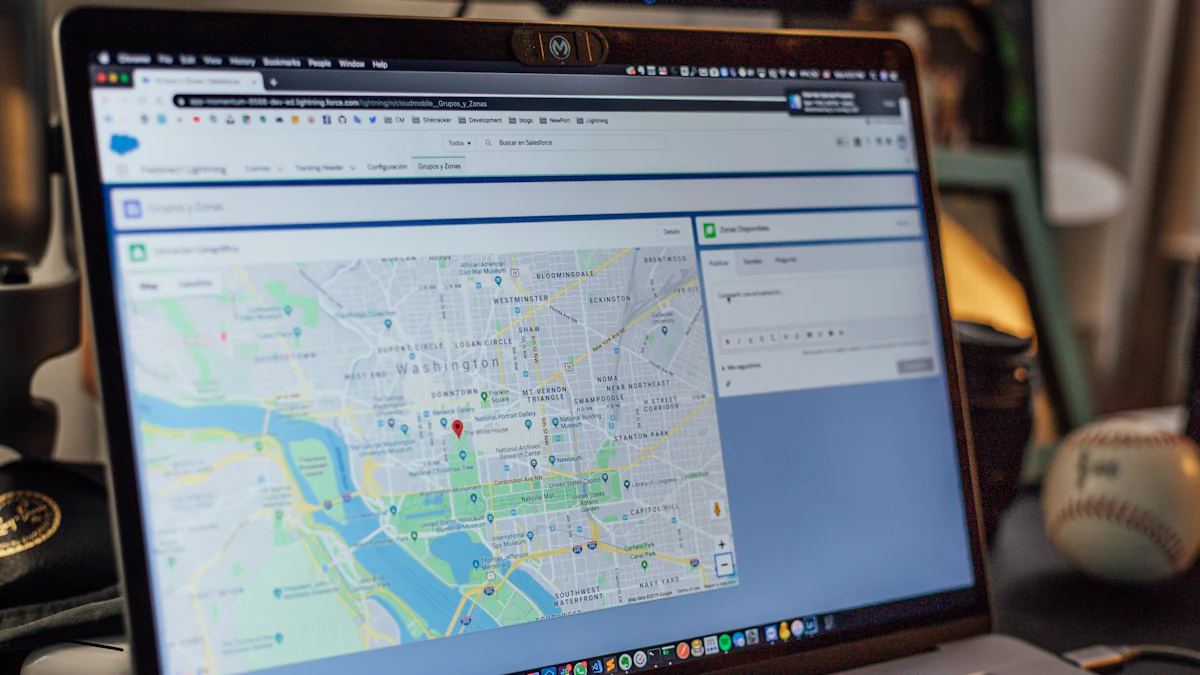
Choosing the right salesforce pricing for small business holds immense importance for small businesses. An effective CRM can boost revenue by 29%, sales productivity by 34%, and conversion rates by a staggering 300%. Salesforce CRM offers numerous benefits, including AI-powered efficiency and a user-friendly interface. A mere 5% increase in customer retention efforts can increase profits by between 25% and 95%. This blog aims to provide six simple strategies to help small businesses select the best Salesforce CRM plan, considering Salesforce pricing for small business needs.
Understand Your Salesforce Pricing For Small Business Needs
Identify Key Requirements
Sales Processes
Small businesses must first understand their sales processes. Sales processes include lead generation, follow-up, and closing deals. Each step requires specific tools and features. Salesforce CRM can help automate and streamline these tasks. Automation reduces manual work and increases efficiency.
Customer Support Needs
Customer support is crucial for small businesses. Efficient customer support builds trust and loyalty. Small businesses need to identify the tools required for handling customer inquiries. Salesforce CRM offers features like case management and customer self-service portals. These tools enhance customer satisfaction and retention.
Marketing Efforts
Marketing efforts drive business growth. Small businesses should evaluate their marketing strategies. Salesforce CRM provides tools for email campaigns, social media integration, and lead tracking. These features help target the right audience and measure campaign success. Effective marketing increases brand visibility and customer engagement.
Assess Current Challenges
Pain Points
Identifying pain points is essential. Pain points are areas where the business struggles. Common pain points include inefficient processes, lack of customer insights, and poor communication. Salesforce CRM can address these issues. The platform offers solutions to streamline workflows and improve data management.
Areas for Improvement
Businesses must assess areas for improvement. Improvement areas might include sales performance, customer service quality, and marketing effectiveness. Salesforce CRM provides analytics and reporting tools. These tools help identify trends and make data-driven decisions. Continuous improvement leads to business growth and success.
Evaluate Salesforce CRM Features

Core Features
Contact Management
Salesforce CRM ensures efficient contact management by providing access to customer data and a history of customer interactions. This feature offers an extensive view of insights and strategies to improve customer engagement. Managing customer relationships becomes easy with this cloud-based system. The platform helps businesses track accounts, close deals quickly, and manage notes, events, and tasks within the app.
Opportunity Management
Salesforce CRM simplifies sales processes with opportunity management. Users can track products involved in deals, including standard prices, quantities, product codes, and quoted prices. The built-in quoting mechanism automatically generates quotes based on client data. The system creates PDFs of approved templates and sends them directly to customers via email. This feature streamlines complex sales processes and ensures accurate forecasting.
Advanced Features
Automation Tools
Salesforce CRM offers powerful automation tools that enhance productivity. Automation reduces manual work and increases efficiency. The platform includes features for data syncing, sales tracking, and customer service. AI-powered tools like Einstein Activity Capture automate routine tasks, allowing businesses to focus on strategic activities. Automation tools help small businesses manage leads, stay on top of sales goals, and identify insights into social trends relevant to the company.
Analytics and Reporting
Salesforce CRM provides robust analytics and reporting tools. These tools help businesses make data-driven decisions. The platform offers a complete view of the sales pipeline and tracks the journey of leads. Users can analyze trends and forecast sales performance accurately. The system also includes real-time leaderboards to identify top performers. Analytics and reporting tools enable continuous improvement and support business growth.
Consider Your Budget
Cost Analysis
Initial Costs
Initial costs play a crucial role in selecting a Salesforce pricing for small business. Small businesses need to evaluate the upfront investment required for different plans. For instance, the Salesforce Essentials Plan offers a cost-effective solution for smaller companies. This plan provides essential features at a lower price point. On the other hand, the Salesforce Professional Plan may require a higher initial investment due to its advanced functionalities. Understanding these initial costs helps businesses make informed decisions.
Ongoing Costs
Ongoing costs also impact the overall budget. These costs include subscription fees, maintenance, and potential upgrades. The Salesforce Enterprise Plan involves higher ongoing expenses but offers extensive features and scalability. Small businesses must consider these recurring costs when choosing a salesforce pricing plan for your small business. Regularly reviewing and managing these expenses ensures financial stability and effective CRM utilization.
ROI Considerations
Long-term Benefits
Evaluating long-term benefits is essential for determining the return on investment (ROI). Salesforce CRM plans provide various advantages that contribute to business growth. For example, automation tools reduce manual tasks, increasing productivity. Analytics and reporting features offer insights for data-driven decisions. These long-term benefits justify the initial and ongoing costs, making the investment worthwhile.
Cost vs. Value
Assessing cost versus value helps in selecting the most suitable CRM plan. The Salesforce Starter Suite combines affordability with essential features, making it ideal for small teams. In contrast, the Unlimited+ Plan caters to larger businesses with advanced needs, including Slack integration. Comparing the cost of each plan with the value it offers ensures that businesses choose a plan that aligns with their goals and budget constraints.
By carefully analyzing costs and considering ROI, small businesses can select a Salesforce CRM pricing plan that provides maximum value and supports sustainable growth.
Explore Different Salesforce Plans
Salesforce Essentials
Features
Salesforce Essentials offers a robust set of features designed for small businesses. The plan includes contact management, opportunity tracking, and task management. Users can also benefit from email integration and customizable dashboards. The platform provides a unified interface to manage sales and customer support activities. Automation tools help streamline repetitive tasks, enhancing productivity.
Pricing
Salesforce Essentials charges $25 per user per month. This pricing makes it an affordable option for small businesses. The plan offers essential features without the financial burden of advanced functionalities. Small businesses can start with this plan and upgrade as their needs grow.
Salesforce Professional
Features
Salesforce Professional combines essential features from the platform's main Clouds. Users get access to advanced sales automation, forecasting, and collaboration tools. The plan includes comprehensive reporting and analytics capabilities. Integration with third-party applications enhances its utility. The platform supports larger teams with more complex requirements.
Pricing
Salesforce Professional offers a higher tier of service at a competitive price. The plan costs more than Salesforce Essentials but provides additional functionalities. This pricing structure makes it suitable for growing businesses. The investment in advanced features can lead to improved efficiency and better customer relationship management.
Salesforce Enterprise
Features
Salesforce Enterprise caters to businesses with extensive CRM needs. The plan includes all standard sales CRM features. Users get access to advanced customization options and workflow automation. The platform supports large-scale operations with robust data management tools. AI-powered features like Einstein Analytics provide deeper insights into business performance.
Pricing
Salesforce Enterprise involves higher ongoing costs compared to other plans. The plan justifies the expense with its extensive feature set. Businesses looking for scalability and advanced functionalities will find this plan beneficial. The investment supports long-term growth and operational efficiency.
Take Advantage of Free Trials and Demos

How to Sign Up
Steps to Register
Salesforce offers a 14-day or 30-day free trial for most products. To sign up:
- Visit the Salesforce website.
- Click on the "Free Trial" button.
- Fill out the registration form with your business details.
- Confirm your email address to activate the trial.
- Access the Salesforce dashboard to start exploring features.
What to Expect
During the trial period, users can explore various Salesforce functionalities. The trial includes access to core features such as contact management and opportunity tracking. Users can also test advanced features like automation tools and analytics. The trial provides a comprehensive overview of what Salesforce CRM offers.
Maximizing Trial Period
Key Features to Test
To make the most of the trial:
- Focus on testing key features.
- Start with contact management to see how Salesforce handles customer data.
- Explore opportunity management to understand sales processes.
- Test automation tools to evaluate efficiency improvements.
- Use analytics and reporting features to gain insights into business performance.
Gathering Feedback
Gathering feedback during the trial period is crucial. Involve team members in testing different features. Collect their opinions on usability and functionality. Assess how well Salesforce addresses business needs. Use this feedback to make an informed decision about purchasing a plan.
Seek Expert Advice
Consulting Services
Benefits of Consulting
Consulting with a Salesforce partner or expert can help ensure that you choose the right solution for your Business. CRM consultants bring extensive knowledge and experience to the table. They can tailor Salesforce CRM to meet specific business needs. Consultants can also assist in implementing the system efficiently. This minimizes disruptions and maximizes productivity.
Consultants provide valuable insights into best practices. They can identify potential pitfalls and offer solutions to avoid them. This proactive approach saves time and resources. Consultants can also train staff on how to use Salesforce CRM effectively. This ensures that the team can leverage the platform's full potential.
Finding the Right Consultant
Finding the right consultant involves several steps. First, look for consultants with relevant experience in your industry. Industry-specific knowledge ensures that the consultant understands unique business challenges. Second, check credentials and certifications. Salesforce offers various certifications that validate a consultant's expertise.
Third, read client testimonials and reviews. Feedback from previous clients provides insights into the consultant's reliability and effectiveness. Fourth, schedule an initial consultation. This meeting allows you to assess the consultant's approach and compatibility with your Business. Finally, discuss pricing and project timelines. Clear communication about costs and deadlines ensures that expectations align.
Online Resources
Forums and Communities
Online forums and communities offer a wealth of information. Platforms like the Salesforce Trailblazer Community provide a space for users to share experiences and solutions. Members can ask questions and receive answers from peers and experts. This collaborative environment fosters learning and problem-solving.
Forums often feature discussions on common issues and best practices. Users can search for topics relevant to their needs. Participating in these discussions helps businesses stay updated on the latest trends and updates. Communities also host events and webinars. These events provide opportunities for networking and professional development.
Official Salesforce Resources
Official Salesforce resources offer comprehensive support. The Salesforce Help Center provides detailed guides and tutorials. Users can find step-by-step instructions for various tasks. The Help Center also includes troubleshooting tips for common issues.
Salesforce offers a range of training programs. Trailhead, Salesforce's online learning platform, features interactive modules and courses. Users can earn badges and certifications to demonstrate their skills. Trailhead covers topics from basic navigation to advanced customization.
Salesforce also publishes whitepapers and case studies. These documents provide in-depth analyses of successful implementations. Businesses can learn from real-world examples and apply similar strategies. Official resources ensure that users have access to accurate and up-to-date information.
Choosing the right Salesforce pricing for small businesses is crucial. The blog discussed six strategies to help in this decision-making process:
- Understand Business Needs: Identify key requirements and assess current challenges.
- Evaluate Salesforce CRM Features: Examine core and advanced features.
- Consider Budget: Analyze initial and ongoing costs and evaluate ROI.
- Explore Different Salesforce Plans: Compare Salesforce Essentials, Professional, and Enterprise plans.
- Take Advantage of Free Trials and Demos: Sign up and maximize the trial period.
- Seek Expert Advice: Utilize consulting services and online resources.
Small businesses should take action to select a pricing plan that aligns with their needs. For further assistance, consider consulting a Salesforce expert.

